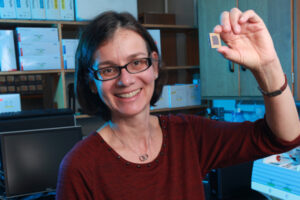This spring, researchers from across Ontario gathered virtually at the 2021 OICR Translational Research Conference (TRC), including interdisciplinary experts in the use of machine learning (ML) and artificial intelligence for cancer research and eventual clinical implementation. During the Conference, a collaborative session was held to identify current challenges and opportunities in using ML within the clinic and identify what a path forward would look like, to accelerate the use of this technology in Ontario.
The discussion addressed various steps in realizing this vision, including improving data collection, developing and validating machine learning models, and facilitating the transition of these systems into clinical use. Panelists examined opportunities to share data, create common standards for ML model development and cited a need to foster cross-disciplinary collaborations to advance ML research in Ontario. The session also reflected on tempering expectations around the use of ML in cancer care, and how the field could deliver tangible results while cutting through the hype surrounding the technology and addressing data bias.
“The opportunities for machine learning in precision cancer medicine are immense, but we face hurdles at various points in the workflow, which limits our ability to transition discoveries into clinical use,” says Dr. Shraddha Pai, Principal Investigator, OICR and co-moderator of the session. “This session allowed those involved in the space to connect and reflect on what’s needed to map out a path forward and help make routine use of machine learning for cancer care a reality in Ontario.”
Among key challenges identified by the group were the lack of well-curated datasets that accurately represent relevant patient populations, a problem fueled by data silos and limited cross-disciplinary conversations to define problems in a manner that facilitates collecting the right data for model-building. A list of key takeaways was generated from the session.
“There are real logistic hurdles around disconnected data and disciplines, which faces researchers who want to develop machine learning models for pre-clinical biomarker discovery and eventual clinical implementation. However, if we manage to fix these issues, Ontario’s system offers features to our advantage,” says Pai. “For example, compared to parts of the U.S., Ontario has the significant advantage of having a universal healthcare system which links patient data through various clinical settings. When set up correctly, data from the OHIP (healthcare system) program, when integrated with biological patient profiles like genomic and imaging data, could accelerate the development of more accurate models representative of the patient population. To realize the value of these data to create impactful clinical tools, we need to break down barriers to data sharing and interdisciplinary collaboration, and create partnerships to identify existing biases in data collection and ensure they don’t lead to the development of misleading models.”
The session included some of Ontario’s foremost experts on machine learning in the context of cancer care:
- Dr. Anne Martel, Sunnybrook Research Institute, Senior Scientist (Machine learning in clinical imaging).
- Dr. Michael Hoffman, Princess Margaret Cancer Centre, Senior Scientist (Machine learning in genomics; liquid biopsy; member of Temerty Centre for AI Research and Education in Medicine)
- Dr. Harriet Feilotter, Queen’s University, Professor, Department of Pathology and Molecular Medicine (Clinical genomics; Ontario Health Data Platform).
- Dr. Amber Simpson, Associate Professor, Department of Biomedical and Molecular Sciences and School of Computing, Queen’s University (Machine learning in clinical imaging; Ontario Health Data Platform).
- Dr. Michelle Brazas (co-moderator), OICR, Senior Program Manager.
- Dr. Shraddha Pai (co-moderator), OICR, Principal Investigator (Machine learning and genomics; member of Temerty Centre for AI Research and Education in Medicine).
Key takeaways from the session can be found here: http://pailab.oicr.on.ca/assets/docs/2021TRC_AIinML_KeyTakeaways.pdf




